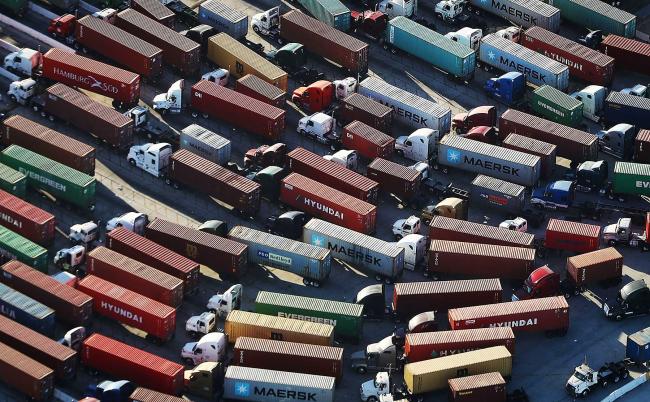(Bloomberg) -- Analysts welcomed U.S. President Donald Trump’s decision to delay the imposition of higher trade tariffs on Chinese shipments, but said it doesn’t signal the end of economic hostilities between the world’s two biggest economies.
Trump announced the delay of higher tariffs for an unspecified period via Twitter on Sunday night, U.S. time. While his tweets said they had made substantial progress, he later told reporters the talks still have "a way to go."
If there’s more progress, Trump said he and Chinese President Xi Jinping plan to meet at his Mar-a-Lago resort to conclude a deal, though he didn’t offer any details as to when. U.S. stock futures climbed in Asian trading Monday following the news, while the offshore yuan extended gains.
Here’s how analysts reacted to the news:
Hua Changchun, Guotai Junan Securities Co.
The two nations will likely reach a deal on all aspects in late March and the tariffs will not rise from the current levels, but that doesn’t mean the conflict between them will be over. Tariff wars will be suspended and we’ll enter the ‘post-trade-war’ era, where the two nations will shift to championing companies, promoting advanced technologies and trying to increase control over global economic rules.
Louis Kuijs, Oxford Economics
This is a positive sign but it’s clearly not the end of difficult negotiations, let alone of the underlying tension between the two countries. Amongst other things, it will be difficult to agree on language on the “verification and enforcement” insisted on by the U.S. but disliked by China. Underlying tensions on technology, China’s industrial policies and, more generally, the rise of China, are unlikely to subside any time soon. Nonetheless, the tariff suspension and, possibly, a more lasting agreement would be a positive for international trade and business in both countries, as well as the global economy more generally.
Li Yishuang, China Securities
The extension of the tariff deadline shows that both sides have a strong will to reach an agreement. The focus is on how China is going to carry out its commitments, especially on government subsidies but there are also more granular issues. As long as both sides are willing to reach a deal, I think they eventually will overcome those obstacles and the probability of a final deal is good. A final deal will be reached after Xi and Trump meet, but on the enforcement of the deal, the two nations will still have some conflicts. This won’t be very smooth.
Wang Huiyao, founder of the Center for China and Globalization
This is a good sign that both sides need a deal at this stage. This is good to stabilize business sentiment in both countries and around the world, and is also good for the stock market. It is also conducive for China’s reforms and opening up, and boosting China-U.S. cooperation.
He Weiwen, former commerce ministry official
This shows that both sides share the will to continue the talks until a final deal, which will be decided by the meeting of Xi and Trump. The temporary no tariff increase creates a stable environment both for the talks and for markets. The ultimate results of the bilateral trade agreement should be the total scrapping of tariffs on $250 billion in Chinese goods, and subsequently on $110 billion of U.S. goods.
Gene Ma, Institute of International Finance
Trump wants a deal, not a war. His time is also running short with the 2020 election on the horizon. Beijing has made a greater commitment to reduce the bilateral trade imbalance. Thus holding back on the additional tariffs in return for some further concessions is not a bad strategy. The question is what he can get at the end. I expect Beijing will offer a longer shopping list, no RMB devaluation, better intellectual property protections, and fewer forced joint ventures. Beijing may tone down "Made in China 2025" but I don’t think it can meaningfully scale back its industrial plans and support for SOEs.
Jonathan Fenby, TSLombard
Trump has been leaning this way since the dinner in Buenos Aires, leading China to play for time -- successfully. Xi and colleagues want to sideline the trade war while they deal with domestic economic challenges and try to pump up confidence. Now the question is whether the focus moves from tariffs to technology where China looks more vulnerable.
Derek Scissors,chief economist, China Beige Book International
The tariff delay was essentially decided in early November. That’s when the President either lost his nerve due to stock market weakness or thought he could get important Chinese help on North Korea. Since then, the only important question has been whether the U.S. has agreed internally on a credible enforcement mechanism. It doesn’t appear that we have and, until we do, the talks are worthless.
To contact Bloomberg News staff for this story: Kevin Hamlin in Beijing at khamlin@bloomberg.net
To contact the editors responsible for this story: Jeffrey Black at jblack25@bloomberg.net, James Mayger
©2019 Bloomberg L.P.
